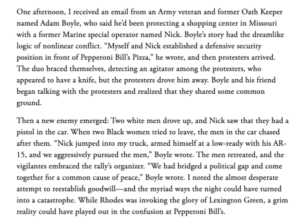Charlie Warzel
Hyperobjects and the challenges ahead. #MustRead
July 8, 2021I wrote a long essay about a pervasive feeling I have about the future. I do not think we are ready for the complex, existential challenges ahead. -Charlie Warzel
We are not ready.
On the climate crisis and other hyperobjects.
These days, I find increasingly myself caught between the worry that I’m being overly alarmist and the fear that I am stating the obvious.
I felt this most strongly in October 2020. Covid cases were surging; the presidential election was near; the far-right areas of the internet I kept an eye on were vibrating with a dark potential energy. All summer, I watched anxiously as people posted videos online of furious Americans taking to the streets. I listened in on walkie-talkie apps as so-called militia groups attempted to recruit and deploy members. News reports said sales of guns and ammo were surging.
I was seized by a deep, persistent dread that these anecdotal instances of civil conflict were a prelude to something bigger. I interviewed scholars who’ve studied revolutions and shared my fears.
Sept. 30th, 2020:
“Reading this exchange…it’s honestly very surprising to me the extent to which we haven’t seen more Kenosha like events already…”
I struggled — and ultimately failed — to put any of this into words at the time. I didn’t know how to convey these anecdotal stories into something that went beyond projecting my anxieties onto the world via the pages of the New York Times. I felt I lacked the language to proportionally describe my concern. I was legitimately worried about large-scale, sustained violent civil conflict across the United States but, if I’m being honest, I was afraid I’d come off as the extremely online, overly alarmist guy.
And yet, if you did occupy the same spaces as I did in October 2020, the specter of civil conflict would have felt just so incredibly obvious as to almost not be worth mentioning. The world was shut down, everyone was trapped inside and online, and more and more people were beginning to detach from reality. Everyone was miserable and scared and angry. Just look around!
This moment offers a window into the way that traditional conceptions and practices of journalism can break down in extraordinary times. I consider not writing this piece back in October a failure. I wrote plenty of columns around and tangential to this subject, yes. But my job is to look at the world through the lens of information and technology and to describe how those elements shape our culture and our politics. I saw something and I didn’t say all of what I thought, in part, because I couldn’t figure out how to talk about it proportionally. I was also pretty fucking scared: of being wrong, but also of being right.
Was I wrong or right? …Yes? There has not been a series of extended, mass casualty conflicts so far — no Civil War 2. But I also urge you watch this video reconstructing January 6th in full and tell me that my sleepless nights in October were a gross overreaction.
Even now, I struggle to find the adequate word to describe the moment. It makes sense: our 21st century existence is characterized by the repeated confrontation with sprawling, complex, even existential problems without straightforward or easily achievable solutions.
Theorist Timothy Morton calls the larger issues undergirding these problems “hyperobjects,” a concept so all-encompassing that it resists specific description. You could make a case that the current state of political polarization and our reality crisis falls into this category. Same for democratic backsliding and the concurrent rise of authoritarian regimes. We understand the contours of the problem, can even articulate and tweet frantically about them, yet we constantly underestimate the likelihood of their consequences. It feels unthinkable that, say, the American political system as we’ve known it will actually crumble.
Climate change is a perfect example of a hyperobject. The change in degrees of warming feels so small and yet the scale of the destruction is so massive that it’s difficult to comprehend in full. Cause and effect is simple and clear at the macro level: the planet is warming, and weather gets more unpredictable. But on the micro level of weather patterns and events and social/political upheaval, individual cause and effect can feel a bit slippery. If you are a news reporter (as opposed to a meteorologist or scientist) the peer reviewed climate science might feel impenetrable. It’s easiest to adopt a cover-your-ass position of: It’s probably climate change but I don’t know if this particular weather event is climate change.
Hyperobjects scramble all our brains, especially journalists. Journalists don’t want to be wrong. They want to react proportionally to current events and to realistically frame future ones. Too often, these desires mean that they do not explicitly say what their reporting suggest. They just insinuate it. But insinuation is not always legible.
I understand these fears and I feel them myself, professionally and personally. I think anyone who says they don’t feel them is probably lying. In fact, these fears, in the right proportion, make for what we traditionally consider a “good journalist.”
After all, many of the best journalists understand how to balance and factor uncertainty into their work. I don’t want journalists to jump to lazy conclusions. I think a deeper embrace of nuance and uncertainty is necessary not just in reporting, but in all elements of mass media.
That embrace sounds good in theory but it’s much harder in practice. How do you talk about an impending, probable-but-not-certain emergency the *right way*? Can you even do that? Can you get people ready for an uncertain, perhaps unspeakably grim future? Is anyone ready?
These questions have re-entered my brain again as I’ve scrolled the news the last few weeks. In late May and early June, there were a rash of reports about Republican efforts to restrict voting rights and halt Democrats’ expansion efforts. There was lots of warranted handwringing about the ways that Republican state legislatures are poised to consolidate power at the local level that could threaten the legitimacy of future presidential elections. Congress was unable to agree to even investigate January 6th, prompting the New Yorker to run the headline, “American Democracy Isn’t Dead Yet, but It’s Getting There.”
The overwhelming message of these pieces was that the America was running out of time on its claim of having even a remotely functioning political system. Even more worrying was the tone, which seemed to suggest it might not feel bad right now, but it’s far worse than you think. “My current level of concern is exploring countries to move to after 2024,” one political scientist told Vox in late May. Cool, cool. My personal doom indicator was a Reuters/Ipsos poll from May, as in two months ago, which found that 53% of Republicans believe Trump is the “true president.”
There are so many dire elements in the forecast for our political future. It seems like a truly formidable challenge for a country to overcome.
Which is why one piece of reporting from this past month felt like a true gut punch. In the Times, Ben Smith wrote a media column about Fox News’ Tucker Carlson, who remains a prolific source for political reporters in Washington, D.C. “Mr. Carlson’s comfortable place inside Washington media, many of the reporters who cover him say, has taken the edge off some of the coverage. It has also served as a kind of insurance policy, they say, protecting him from the marginalization that ended the Fox career of his predecessor, Glenn Beck,” Smith wrote. “‘If you open yourself up as a resource to mainstream media reporters, you don’t even have to ask them to go soft on you,’” a journalist told Smith in the piece.
I’ve reported on the far-right. I understand that the reporting process frequently brings you into contact with loathsome individuals and that, at times, these people can be quite helpful, because cynical political grifters love to turn on each other and gossip and vent just like everyone else. I’ve broken some stories, stories I’m proud of, off tips from true cretins — so take my pearl clutching with whatever grains of salt you wish.
Still, Smith’s column haunted me. You can argue Carlson is who he has always been, or that his Trump era project of (barely) laundering white nationalist talking points into mainstream political discourse is disingenuous, pandering to viewers for whom he has utter contempt. I don’t care. What I do care about is a political press that has a seemingly neutral or symbiotic relationship with a guy who beams this rhetoric into three million homes a night:
[Tucker Carlson soundbite; will not post. -dayle]
It’s worth noting that some of those same articles I read back in the fall, warning of democratic backsliding, single out Carlson as one of the animators of a dark grievance culture that threatens our social/political fabric. “The strongest factors are racial animosity, fear of becoming a white minority and the growth of white identity,” Virginia Gray, a political scientist at the University of North Carolina told the Times’ Tom Edsall, singling out a Carlson monologue from April.
It’s hard for me to square the Carlson source coziness with the host’s increasingly dangerous replacement theory and anti-vaxx rhetoric. The disconnect between the threat Carlson poses and the political media’s shrugging proximity to him fills me with a deep dread for my industry — and a very real concern that it will not be able to rise to the challenge of our moment (a shaky democratic foundation, increasingly fewer points of shared reality, a climate emergency, to name a few).
I’m not trying to dog reporters working in a shitty, gutted media ecosystem that mostly runs off algorithmic attention and online advertising that most people hate. There is no shortage of vital, journalism going on. But, structurally, there are still glaring problems with some traditional outdated journalistic norms and practices: management that still struggles to understand complex internet dynamics, a commitment to journalistic impartiality that does not work in an era where one political party has largely abandoned democracy and, in some cases, reality.
Over the last half decade, I watched political journalists and editors tie themselves in knots arguing over whether to call Trump a racist or whether the Republican party was really becoming anti-democratic or whether Trump’s election denial was a “coup.” In each instance there’s a side arguing that the other needs to calm down, that things are not as bad as they appear. I used to think these people had a lack of imagination.
Now, I see it as a strong normalcy bias. Writer Jonathan Katz calls this an ‘unthinkability’ that “pervades conversations about so many things in our moment.” Basically: we humans are good at repressing terrifying realities that feel unthinkable and steering them back into more acceptable bounds of conversation.
Climate coverage offers the clearest picture of this ‘unthinkability’ dynamic. In a clip from June 7th, CBS meteorologist Jeff Berardelli describes a heat wave stifling the east coast and the exceptional levels of draught in the West. His tone is urgent and the maps he’s gesturing to on the screen are alarming. He doesn’t mince words. “This is a climate emergency,” he tells one of the morning show anchors. It’s the kind of grim statement that you might imagine would evoke a bit of stunned silence.
Instead, the anchor smiles broadly and shakes his head in faux disbelief. “It’s very hot! I feel parched just talking about it!” he says in perfect, playful news cadence. Berardelli and the others on set offer up a classic morning show chuckle. Isn’t that something else! Banter! Onto the next segment.
[CBS warning of extreme heat soundbite.]
This is a particularly egregious example of a conventional form of media (in this case, the lighthearted morning show segment) that is woefully inadequate for the subject matter (the existential heating of the planet that will render large swaths of it hostile to human life in the near future).
In her excellent newsletter Heated, Emily Atkin has written about the systemic failureof the media to inform readers/viewers as to why it is so goddamn hot this summer. She cites the work of Colorado journalist Chase Woodruff, who surveyed recent reporting on the state’s recent heat wave and found that out of “149 local news stories written about the unprecedented hot temperatures…only 6 of those stories mentioned climate change.” The others, Atkin notes, “covered it as if it were an act of God.”
This behavior isn’t new. Back in 2018, Atkin wrote a story on the media’s failure to connect the dots on climate change. NPR’s science editor told her that “You don’t just want to be throwing around, ‘This is due to climate change, that is due to climate change.’” The editor required reporters to speak to a climate scientist before being allowed to attribute extreme temperatures to climate change. It’s an instance, Atkin argues, of “over-abundance of journalistic caution” — primarily attributable to fear. Fear of backlash from denialists, politicians, or other journalists — maybe even fear of being right.
In my mind, there’s an incredibly important distinction between embracing complexity and uncertainty in the world and what those Colorado publications, following the lead of so many others, did by not mentioning climate change — because, well, weather is complex and we don’t want to get yelled at so who’s to say?!! The problem isn’t legitimate nuance. It’s when decision makers in the media space use the existence of uncertainty as an excuse not to say what needs to be said.
Sometimes, though, mistakes aren’t nefarious. A missed or botched narrative is caused by a little bit of everything. A lot of the retroactive criticism around coronavirus coverage pre-March 2020 was that big media outlets downplayed pandemic fears because they relied heavily on credible expert sources who themselves were inclined not to be alarmists. Some in the media were doing their job just as intended and unwittingly providing false comfort. Others were providing false comfort because they didn’t want to be outliers. And another group mostly ignored the threat because platform or other media incentives directed their focus away from an unknown respiratory illness in China.
These scenarios are the product of living with and reporting on hyperobjects. The big picture — we’re losing our grip on what’s real; our political system is fraying and unsustainable; the planet is burning — is pretty clear and obvious. But many of the particulars (Is that specific hurricane climate change? Is this bill/piece of misinformation/person a threat to the democracy?) become skirmishes in the culture war.
I don’t particularly know what to do about any of this. One problem when facing down a hyperobject-sized crisis is that it overwhelms. In a recent piece, Sarah Miller articulated what it feels like to stare down existential dread on the subject of climate change. She argues that, after a certain point, traditional methods, like writing, feel futile:
“Let’s give the article…the absolute biggest benefit of the doubt and imagine that people read it and said, “Wow this is exactly how I feel, thanks for putting it into words.” What then? What would happen then? Would people be “more aware” about climate change? It’s 109 degrees in Portland right now. It’s been over 130 degrees in Baghdad several times. What kind of awareness quotient are we looking for? What more about climate change does anyone need to know? What else is there to say?
Miller’s questions ask us to consider and reconsider what our roles are right now. Yes, we have our jobs and the way we’ve been trained or conditioned or rewarded to do them and that’s all very fine and good. But what about now? Does that training hold up in remarkable, existential-feeling moments like the one we are in? Are these jobs, the way we’ve been taught to do them, important now? How do we prepare people for the uncertain, grim contours of the future? Can we do that?
I think these are the questions journalists have to be asking ourselves at every moment right now. But not just journalists. Hyperobject-sized problems impact everyone. That’s why they’re hyperobjects. And I don’t think any of us are ready. The pandemic showed us how difficult it is, at a societal level, to grasp complex ideas like, say exponential growth. And there are examples everywhere of our human inability to think longterm or pay big costs upfront to avoid catastrophe later (See: this haunting interview about the Miami condo collapse).
But not being ready isn’t quite the same as being doomed to a foregone conclusion. There’s the way we’ve done things and the way we need to do things now. How do we make up the difference between those two notions? We must be probabalistic in our predictions and understanding when they fall short. We need all need to learn to work and think on different levels, holding steadfastly to what is not up for debate, and not dividing ourselves needlessly over what is.
As good as that might sound, I feel foolish writing it. I’m not all that certain any human being can hold such conflicting notions in their head all the time. But that doesn’t mean it isn’t worth trying.
Living with hyperobjects is hard. I don’t think we’re ready for any of what is to come. I feel alarmist saying this. But it also feels incredibly obvious.
Re-visiting Fairness in Power for Attention
February 5, 2021During the Nixon administration in the 1970’s, the FCC called the Fairness Doctrine the “single most important requirement of operation in the public interest” (Becker, 2017, para. 8)
Becker, W. (2017, Feb. 23). What’s behind Trump’s war with the press? Huffpost.
Retrieved from https://www.huffingtonpost.com/entry/whats-behind-trumps-war-with-the-press_us_58addf5ce4b0598627a55f9e
Seth Godin:
The internet clearly has a trust problem. As with most things, it helps to start with the Grateful Dead.
After their incarnation as the Warlocks, they became more than a band. It was a family on the road. There were people who gave up their careers to follow them around, living on buses… they were seeing thirty or forty shows a year. You traded tickets, did favors, built relationships. People in the family knew that they’d be seeing each other again soon.
And then, in 1987, Touch of Grey went to #1 (their only top 40 hit) and it attracted a huge (and different) crowd to the shows. Reports were that the intimacy and trust disappeared.
Glen Weyl points out that the internet was started by three tribes, as different from each other as could be. The military was behind the original ARPA (and then DARPA) that built and funded it. Professors at universities around the world were among the early users. And in San Francisco, a group of ‘hippies’ were the builders of some of the first culture online.
Because each of these groups were high-trust communities, it was easy to conclude that the people they’d be engaging online would be too. And so, as the tools of the internet and then the web were built out, they forgot to build a trust layer. Plenty of ways to share files, search, browse, chat and talk, but no way to engage in the very complicated things that humans do around identity and trust.
Humans have been in tribal relationships since before recorded history began. The word “tribe” appears in the Bible more than 300 times. But the internet isn’t a community or a tribe. It’s simply a technology that amplifies some voices and some ideas. When we don’t know who these people are, or if they’re even people, trust erodes.
When a site decides to get big fast, they usually do it by creating a very easy way to join, and they create few barriers to a drive-by anonymous experience. And when they make a profit from this behavior, they do it more. In fact, they amplify it.
Which makes good business in the short run, but lousy public policy.
Twenty years ago, I wrote that if someone goes into a bank wearing a mask (current pandemic aside) we can assume that they’re not there to make a deposit.
And now we’re suffering from the very openness and ease of connection that the internet was built on. Because a collection of angry people talking past each other isn’t a community. Without persistence of presence, some sort of identity and a shared set of ideals, goals and consequences, humans aren’t particularly tempted to bring their best selves to the table.
The system is being architected against our best impulses. Humans understand that local leadership, sacrifice and generosity build community, and that fights and scandals simply create crowds. Countless people are showing up, leading and pushing back, but algorithms are powerful and resilient, and we need some of them to be rebuilt.
Until there’s a correlation between what’s popular or profitable and what’s useful, we’re all going to be paying the price.
Freedom Forum
Opinion by Nicole Hemmer
‘The Fairness Doctrine, a regulation from the late ‘40’s until 1987, dictated balanced coverage of controversial issues on broadcast radio and television. After its repeal, Rush Limbaugh & Fox News quickly became two of the most influential political institutions in the US.
George Orwell
Want to reinstate the FCC’s Fairness Doctrine to help curb the spread of disinformation? Conservatives and liberals both may well want to reconsider that idea, argues a Columbia University scholar.’
What America needs instead is a creative, comprehensive effort by both the private sector and the government to disincentivize conspiracies and misinformation on the many platforms on which they flourish. Some social media companies have begun this work, clearing out QAnon sites and banning some far-right and White power users and communities who pose a threat.That work needs to continue, with careful attention to the biggest offenders who game algorithms and media structures to spread misinformation. But sources of misinformation also need to be demonetized, whether they are YouTube channels or national cable networks, and algorithms tweaked to slow down the spread of extreme content.’
NYTimes
I Talked to the Cassandra of the Internet Age
The internet rewired our brains. He predicted it would.
Posted on twitter 2.4.21:
“I’m going to spend more time writing on this because this is not only a digital detox story. it’s a story about power. And it’s at the center of everything.”
“Michael Goldhaber is the internet prophet you’ve never heard of. Here’s a short list of things he saw coming: the complete dominance of the internet, increased shamelessness in politics, terrorists co-opting social media, the rise of reality television, personal websites, oversharing, personal essay, fandoms and online influencer culture — along with the near destruction of our ability to focus.
Most of this came to him in the mid-1980s, when Mr. Goldhaber, a former theoretical physicist, had a revelation. He was obsessed at the time with what he felt was an information glut — that there was simply more access to news, opinion and forms of entertainment than one could handle. His epiphany was this: One of the most finite resources in the world is human attention. To describe its scarcity, he latched onto what was then an obscure term, coined by a psychologist, Herbert A. Simon: “the attention economy.”
Advertising is part of the attention economy. So are journalism and politics and the streaming business and all the social media platforms. But for Mr. Goldhaber, the term was a bit less theoretical: Every single action we take — calling our grandparents, cleaning up the kitchen or, today, scrolling through our phones — is a transaction. We are taking what precious little attention we have and diverting it toward something. This is a zero-sum proposition, he realized. When you pay attention to one thing, you ignore something else.
The idea changed the way he saw the entire world, and it unsettled him deeply. “I kept thinking that attention is highly desirable and that those who want it tend to want as much as they can possibly get,” Mr. Goldhaber, 78, told me over a Zoom call last month after I tracked him down in Berkeley, Calif. He couldn’t shake the idea that this would cause a deepening inequality.
“When you have attention, you have power, and some people will try and succeed in getting huge amounts of attention, and they would not use it in equal or positive ways.”
More than a decade later, Mr. Goldhaber lives a quiet, mostly retired life. He has hardly any current online footprint, except for a Twitter account he mostly uses to occasionally share posts from politicians. I found him by calling his landline. But we are living in the world he sketched out long ago. Attention has always been currency, but as we’ve begun to live our lives increasingly online, it’s now the currency. Any discussion of power is now, ultimately, a conversation about attention and how we extract it, wield it, waste it, abuse it, sell it, lose it and profit from it.
While Mr. Goldhaber said he wanted to remain hopeful, he was deeply concerned about whether the attention economy and a healthy democracy can coexist. Nuanced policy discussions, he said, will almost certainly get simplified into “meaningless slogans” in order to travel farther online, and politicians will continue to stake out more extreme positions and commandeer news cycles. He said he worried that, as with Brexit, “Rational discussion of what people stand to gain or lose from policies will be drowned out by the loudest and most ridiculous.”
[Alex Kiesling]
Full article:





